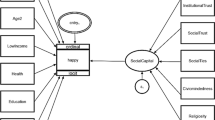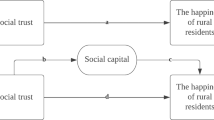Abstract
The aims of this study were to investigate how much variance in happiness was attributable to household and administrative-area levels and to examine the associations between social capital at the individual, household, and administrative-area levels and happiness, while adjusting for various control variables at multiple levels. Data from the Seoul Welfare Panel Study (SWPS) beginning in 2008 and conducted by the Seoul Welfare Foundation were used for this study. This study used wave 1 of the SWPS (2008). The results showed that a relatively small percentage of happiness was attributed to the administrative-area level compared to the household level, which implies that a household context is more important for understanding the variation in individual happiness. The results also showed that individual level social capital variables including perceived helpfulness and volunteer work were positively associated with happiness. Perceived helpfulness and organizational participation at the household level were positively associated with happiness. However, no significant association could be found between administrative-area level social capital variables and happiness. The results indicate that different types of social capital at different levels may operate differently to happiness. The current study contributed to the empirical social capital literature by simultaneously considering the individual, household, and administrative-area levels and examining each one’s association with happiness while controlling for various control variables at multiple levels.
Similar content being viewed by others
References
Becchetti, L., Ricca, E. E., & Pelloni, A. (2011). The relationship between social leisure and life satisfaction: Causality and policy implications. Social Indicators Research,. doi:10.1007/s11205-011-9887-5.
Bentley, R., Baker, E., Mason, K., Subramanian, S. V., & Kavanagh, A. M. (2011). Association between housing affordability and mental health: A longitudinal analysis of a national representative household survey in Australia. American Journal of Epidemiology, 174(7), 753–760.
Berkman, L., & Syme, S. (1979). Social networks, host resistance, and mortality: a nine-year follow-up of alameda county residents. American Journal of Epidemiology, 109, 186–204.
Coleman, J. S. (1988). Social capital in the creation of human capital. American Journal of Sociology, 94, S95–S120.
Coleman, J. S. (1990). The foundations of social theory. Cambridge, MA: Harvard University Press.
Cunado, J., & de Gracia, F. P. (2012). Environment and happiness: New evidence for Spain. Social Indicators Journal,. doi:10.1007/s11205-012-0038-4.
De Silva, M. J. (2006). Systematic review of the methods used in studies of social capital and mental health. In K. McKenzie & T. Harpham (Eds.), Social capital and mental health (pp. 39–67). London: Jessica Kingsley Publishers.
De Silva, M. J., Mckenzie, K., Harpham, T., & Huttly, S. R. A. (2005). Social capital and mental illness: A systematic review. Journal of Epidemiology and Community Health, 59(8), 619–627.
Di Tella, R., MacCulloch, R. J., & Oswald, A. J. (2003). The macroeconomics of happiness. Review of Economics and Statistics, 85(4), 809–827.
Diener, E. (2000). Subjective well-being: The science of happiness, and a proposal for a national index. American Psychologist, 55(1), 34–43.
Dolan, P., Peasgood, T., & White, M. (2008). Do we really know what makes us happy? A review of the economic literature on the factors associated with subjective well-being. Journal of Economic Psychology, 29(1), 94–122.
Efron, B., & Gong, G. (1983). A leisurely look at the bootstrap, the jackknife, and cross-validation. The American Statistician, 37(1), 36–48.
Elgar, F. J., Davis, C. G., Wohl, M. J., Trites, S. J., Zelenski, J. M., & Martin, M. S. (2011). Social capital, health and life satisfaction in 50 countries. Health and Place, 17(5), 1044–1053.
Farrell, S., Aubry, T., & Coulombe, D. (2004). Neighborhoods and neighbors. Do they contribute to personal well-being? Journal of Community Psychology, 32(1), 9–25.
Ferrer-i-Carbonell, A., & Frijters, J. M. (2004). How important is methodology for the estimates of the determinants of happiness? The Economic Journal, 114(497), 641–659.
Fone, D., Dunstan, F., Lloyd, K., Williams, G., Watkins, J., & Palmer, S. (2007). Does social cohesion modify the association between area income deprivation and mental health? A multilevel analysis. International Journal of Epidemiology, 36(2), 338–345.
Fukuyama, F. (1995). Trust: The social virtues and the creation of prosperity. New York: The Free Press.
Giordano, G. N., & Lindstrom, M. (2010). The impact of changes in different aspects of social capital and material conditions on self-rated health over time: A longitudinal cohort study. Social Science and Medicine, 70(5), 700–710.
Giordano, G. N., & Lindstrom, M. (2011). Social capital and change in psychological health over time. Social Science and Medicine, 72(8), 1219–1227.
Giordano, G. N., Ohlsson, H., & Lindström, M. (2011). Social capital and health-purely a question of context? Health & Place, 17(4), 946–953.
Hamano, T., Fujisawa, Y., Ishida, Y., Subramanaian, S. V., Kawachi, I., & Shiwaku, K. (2010). Social capital and mental health in Japan: a multilevel analysis. Plos One, 5(10), 1–6.
Han, S., Kim, H., & Lee, H. (2012). A multilevel analysis of the compositional and contextual association of social capital and subjective well-being in Seoul, South Korea. Social Indicators Research. doi:10.1007/s11205-011-9990-7.
Harpham, T., Grant, E., & Thomas, E. (2002). Measuring social capital within health surveys: key issues. Health Policy and Planning, 17(1), 106–111.
Helliwell, J. F., & Putnam, R. (2004). The social context of well-being. Philosophical Transactions of the Royal Society London, 359(1440), 1435–1446.
Hooghe, M., & Vanhoutte, M. (2011). Subjective well-being and social capital in Belgian communities. The impact of community characteristics on subjective well-being indicators in Belgium. Social Indicators Research, 100(1), 17–36.
Hurdatao, D., Kawachi, I., & Sudarsky, (2011). Social capital and self-rated health in colombia: The good, the bad and the ugly. Social Science and Medicine, 72(4), 584–590.
Kim, D. (2008). Blues from the neighborhood? Neighborhood characteristics and depression. Epidemiologic Reviews, 30(10), 101–117.
Kim, S., Chung, Y., Perry, M. J., Kawachi, I., & Subramanian, (2012). Association between interpersonal trust, reciprocity, and depression in South Korea: A prospective analysis. PLoS ONE, 7(1), e30602.
Kim, D., Jeon, G., & Jang, S. (2010). Socioeconomic status, social support and self-rated health among lone mothers in South Korea. International Journal of Public Health, 55, 551–559.
Kim, D., & Kawachi, I. (2006). A multilevel analysis of key forms of community and individual level social capital as predictors. Journal of Urban Health, 83, 813–826.
Kim, D., Subramanian, S. V., Gortmaker, S. L., & Kawachi, I. (2006). US state- and county-level social capital in relation to obesity and physical inactivity: A multilevel, multivariable analysis. Social Science and Medicine, 63(4), 1045–1059.
Leung, A., Kier, A., Fung, T., & Fung, L. (2011). Searching for happiness: The importance of social capital. Journal of Happiness Studies, 12(3), 443–462.
Levi, M. (1996). Social and unsocial capital: a review essay of Robert Putnam's making democracy work. Politics & Society, 24(1), 45–55.
Luo, W., & Azen, R. (2013). Determining predictor importance in hierarchical linear models using dominance analysis. Journal of Educational and Behavioral Statistics, 38(1), 3–31.
Merlo, J., Chaix, B., Yang, M., Lynch, J., & Rastam, L. (2005a). A brief conceptual tutorial of multilevel analysis in social epidemiology: Linking the statistical concept of clustering to the idea of contextual phenomenon. Journal of Epidemiology and Community Health, 59(6), 443–449.
Merlo, J., Chaix, B., Yang, M., Lynch, J., & Rastam, L. (2005b). A brief conceptual tutorial of multilevel analysis in social epidemiology: Interpreting neighbourhood differences and the effect of neighbourhood characteristics on individual health. Journal of Epidemiology and Community Health, 59(12), 1022–1029.
Muennig, P., Cohen, A. K., Palmer, A., & Zhu, W. (2013). The relationship between five different measures of structural social capital, medical examination outcomes, and mortality. Social Science and Medicine, 85, 18–26.
Orviska, M., Caplanova, A., & Hudson, J. (2012). The impact of democracy on well-being. Social Indicators Research,. doi:10.1007/s11205-012-9997-8.
Peiro, A. (2006). Happiness, satisfaction and socio-economic conditions: Some international evidence. The Journal of Socio-Economics, 35(2), 348–365.
Poortinga, W. (2006a). Social capital: An individual or collective resource for health? Social Science and Medicine, 62(2), 292–302.
Poortinga, W. (2006b). Social relations or social capital? Individual and community health effects of bonding social capital. Social Science and Medicine, 63(1), 255–270.
Poortinga, W. (2011). Community resilience and health: The role of bonding, bridging, and linking aspects of social capital. Health & Place, 18(2), 286–295.
Putnam, R. D. (1995). Tuning in, tuning out-the strange disappearance of social capital in America. Ps Political Science & Politics, 28(4), 664–683.
Putnam, R. D. (2000). Bowling alone: The collapse and revival of American community. New York: Simon & Schuster.
Rabe-Hesketh, S., & Skrondal, A. (2012). Multilevel and longitudinal modeling using stata, vol. I: Continuous responses (3rd ed.). Texas: Stata Press.
Requena, F. (2003). Social capital, satisfaction and quality of life in the workplace. Social Indicators Research, 61(3), 331–360.
Schiffrin, H. H., & Nelson, S. K. (2010). Stressed and happy? Investigating the relationship between happiness and perceived stress. Journal of Happiness Studies, 11(1), 33–39.
Schultz, J., O’Brien, A. M., & Tadesse, B. (2008). Social capital and self-rated health: Results from the US 2006 social capital survey of one community. Social Science and Medicine, 67(4), 606–617.
Snijders, T. A., & Bosker, R. J. (2012). Multilevel analysis: An introduction to basic and advanced multilevel modeling (2nd ed.). Thousand Oaks: Sage.
Subramanian, S. V., Kim, D., & Kawachi, I. (2005). Covariation in the socioeconomic determinants of self-rated health and happiness: A multivariate multilevel analysis of individuals and communities in the USA. Journal of Epidemiology and Community Health, 59, 664–669.
Subramanian, S. V., Lochner, K. A., & Kawachi, I. (2003). Neighborhood differences in social capital: a compositional artifact or a contextual construct? Health & Place, 9(1), 33–44.
Tokuda, Y., Fujii, S., & Inoguchi, T. (2010). Individual and country-level effects of social trust on happiness: The Asia Barometer Survey. Journal of Applied Social Psychology, 40(10), 2574–2593.
Veenstra, G. (2005). Location, location, location: Contextual and compositional health effects of social capital in British Columbia. Canada, Social Science & Medicine, 60(9), 2059–2071.
Veenstra, G., Luginaah, I., Wakefield, S., Birch, S., Eyles, J., & Elliott, S. (2005). Who you know, where you live: Social capital, neighbourhood and health. Social Science & Medicine, 60(12), 2799–2818.
Verhaeghe, P. P., Pattyn, E., Bracke, P., Verhaeghe, M., & Van De Putte, B. (2012). The association between network social capital and self-rated health: Pouring old wine in new bottles? Health & Place, 18(2), 358–365.
Wilkinson, R. G. (1996). Unhealthy societies: The afflictions of inequality. London: Routledge.
Winkelmann, R. (2009). Unemployment, social capital, and subjective well-being. Journal of Happiness Studies, 10(4), 421–430.
Yip, W., Subramanian, S. V., Mitchell, A. D., Lee, D. T. S., Wang, J., & Kawachi, I. (2007). Does social capital enhance health and well-being? Evidence from rural China. Social Science & Medicine, 64(1), 35–49.
Ziersch, A., & Baum, F. (2004). Involvement in civil society groups: Is it good for your health? Journal of Epidemiology and Community Health, 58(6), 493–500.
Author information
Authors and Affiliations
Corresponding author
Rights and permissions
About this article
Cite this article
Han, S. Social Capital and Subjective Happiness: Which Contexts Matter?. J Happiness Stud 16, 241–255 (2015). https://doi.org/10.1007/s10902-014-9506-7
Published:
Issue Date:
DOI: https://doi.org/10.1007/s10902-014-9506-7




